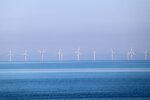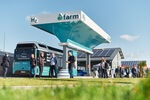03/10/2009
South Africa - Study for R850 million wind farm to start this month
The environmental impact assessment (EIA) for the proposed 50 MW wind farm in the vicinity of St Helena Bay in the Western Cape is anticipated to begin in March this year.
The R850-million renewable-energy project, dubbed the St Helena Bay Wind Farm, would be one of the next generation large-scale wind farms to be developed in South Africa, after the 5,2 MW Darling wind farm, which was officially launched in May last year, and Eskoms’ proposed Koekenaap project.
Genesis Eco-Energy COO Davin Chown explains that the EIA for the renewable energy project was originally scheduled to start in June last year.
“However, the EIA was delayed owing to the fact that a number of international investors were concerned about the international macroeconomic climate and the uncertainty in the international financial markets and, thus, were averse to provide funding for the St Helena Bay project at that time,” elaborates Chown.
“In addition, the uncertainty around the Department of Minerals and Energy’s Expression of Interest process for renewable energy projects, which will afford project developers and Independent Power Producer’s (IPP) a sound opportunity to really help develop and drive the renewable energy market, is another concern for investors,” says Chown.
More notably, Chown states that, while investors are very keen to invest in the project, they are reluctant to commit finances while the National Energy Regulator of South Africa (Nersa) is still deliberating on the proposed feed-in tariff scheme for the renewable energy sector.
The proposed feed-in tariff (FIT) was circulated for public comment last year and the national regulator concluded its public hearings last week as part of the official consultation process.
The FIT is a financing mechanism that will stimulate the development of the renewable energy industry in South Africa.
The basic economic principle underpinning the feed-in tariff is the establishment of a tariff, or price, that covers the cost of generation plus a reasonable profit to induce developers to invest in renewable energy projects and associated infrastructure.
Nersa is presently deliberating on the comments received during the public hearings and it is anticipated that the national energy regulator will make a decision regarding the implementation of the feed-in tariff scheme in early March.
Chown elaborates that Genesis Eco-Energy will examine Nersa’s announcement of its findings regarding the feed-in tariff as this signal from the regulator will be key in determining a projects success.
Chown is confident that once Nersa announces its decision on the feed-in tariff, Genesis Eco-Energy will be able to secure local and international funding for the R850-million project based on the keen interest shown by the development and finance community.
While the EIA for this project has yet to commence, Chown tells Engineering News that the company has been monitoring and collating site-level wind data on the farm since May last year.
“A formal EIA approval will allow further wind monitoring at hub height for an additional period of time in order to ensure the wind regime is suitable for the envisaged development,” explains Chown.
“Wind data is very crucial and the banks need a full year’s worth of verifiable data, supported by long term background data, in order to approve funding for the project.”
The vicinity of St Helena Bay is known to be a particularly windy area, with general wind speeds of six metres a second and above according to data available from the weather services.
Chown explains that the wind farm will be located on a 926-ha farm, which is owned by the local Seeland Development Trust.
It is envisaged that the wind farm will most likely be suited to a project in the range between 30 and 50MW, with 80MW being the maximum size that the farm could accommodate pending EIA approvals.
The energy will be fed into the national grid.
Chown states that it has not been determined how many wind turbines will be required to generate this electricity as Genesis is still in procurement discussions with international and local wind turbine manufacturers and the final decisions will be based on the confirmed wind regime on the farm as well as on the provisions of the record of decision pertaining to a number issues in the EIA such as visual impact.
“Although we are is discussions with local manufacturers, owing to the international credit crisis, many of the European renewable wind energy projects have been shelved,” says Chown.
“This means that European manufacturers have availability of stock and we can fast-track the importation of wind turbines for this project.” Wind turbines with a generation capacity of between 1,8 MW and 2,5 MW are being considered.
It is anticipated that the St Helena Bay Wind Farm would be able to generate up to 2% of the entire Western Cape's 3 500-MW summer requirements.
Chown states that this project is essential for the St Helena Bay area as the rapid urban development in the area means the energy supply to the area may face a number of challenges in providing supply.
“In addition, Saldanha has one of the highest carbon footprints per capita in the country and a green energy project of this nature will certainly help to offset the towns carbon emissions, create local employment opportunities, as well as contribute significantly to the Provincial Governments climate change mitigation objectives” concludes Chown.
For more information please cntact Trevor Sievert at ts@windfair.net
The R850-million renewable-energy project, dubbed the St Helena Bay Wind Farm, would be one of the next generation large-scale wind farms to be developed in South Africa, after the 5,2 MW Darling wind farm, which was officially launched in May last year, and Eskoms’ proposed Koekenaap project.
Genesis Eco-Energy COO Davin Chown explains that the EIA for the renewable energy project was originally scheduled to start in June last year.
“However, the EIA was delayed owing to the fact that a number of international investors were concerned about the international macroeconomic climate and the uncertainty in the international financial markets and, thus, were averse to provide funding for the St Helena Bay project at that time,” elaborates Chown.
“In addition, the uncertainty around the Department of Minerals and Energy’s Expression of Interest process for renewable energy projects, which will afford project developers and Independent Power Producer’s (IPP) a sound opportunity to really help develop and drive the renewable energy market, is another concern for investors,” says Chown.
More notably, Chown states that, while investors are very keen to invest in the project, they are reluctant to commit finances while the National Energy Regulator of South Africa (Nersa) is still deliberating on the proposed feed-in tariff scheme for the renewable energy sector.
The proposed feed-in tariff (FIT) was circulated for public comment last year and the national regulator concluded its public hearings last week as part of the official consultation process.
The FIT is a financing mechanism that will stimulate the development of the renewable energy industry in South Africa.
The basic economic principle underpinning the feed-in tariff is the establishment of a tariff, or price, that covers the cost of generation plus a reasonable profit to induce developers to invest in renewable energy projects and associated infrastructure.
Nersa is presently deliberating on the comments received during the public hearings and it is anticipated that the national energy regulator will make a decision regarding the implementation of the feed-in tariff scheme in early March.
Chown elaborates that Genesis Eco-Energy will examine Nersa’s announcement of its findings regarding the feed-in tariff as this signal from the regulator will be key in determining a projects success.
Chown is confident that once Nersa announces its decision on the feed-in tariff, Genesis Eco-Energy will be able to secure local and international funding for the R850-million project based on the keen interest shown by the development and finance community.
While the EIA for this project has yet to commence, Chown tells Engineering News that the company has been monitoring and collating site-level wind data on the farm since May last year.
“A formal EIA approval will allow further wind monitoring at hub height for an additional period of time in order to ensure the wind regime is suitable for the envisaged development,” explains Chown.
“Wind data is very crucial and the banks need a full year’s worth of verifiable data, supported by long term background data, in order to approve funding for the project.”
The vicinity of St Helena Bay is known to be a particularly windy area, with general wind speeds of six metres a second and above according to data available from the weather services.
Chown explains that the wind farm will be located on a 926-ha farm, which is owned by the local Seeland Development Trust.
It is envisaged that the wind farm will most likely be suited to a project in the range between 30 and 50MW, with 80MW being the maximum size that the farm could accommodate pending EIA approvals.
The energy will be fed into the national grid.
Chown states that it has not been determined how many wind turbines will be required to generate this electricity as Genesis is still in procurement discussions with international and local wind turbine manufacturers and the final decisions will be based on the confirmed wind regime on the farm as well as on the provisions of the record of decision pertaining to a number issues in the EIA such as visual impact.
“Although we are is discussions with local manufacturers, owing to the international credit crisis, many of the European renewable wind energy projects have been shelved,” says Chown.
“This means that European manufacturers have availability of stock and we can fast-track the importation of wind turbines for this project.” Wind turbines with a generation capacity of between 1,8 MW and 2,5 MW are being considered.
It is anticipated that the St Helena Bay Wind Farm would be able to generate up to 2% of the entire Western Cape's 3 500-MW summer requirements.
Chown states that this project is essential for the St Helena Bay area as the rapid urban development in the area means the energy supply to the area may face a number of challenges in providing supply.
“In addition, Saldanha has one of the highest carbon footprints per capita in the country and a green energy project of this nature will certainly help to offset the towns carbon emissions, create local employment opportunities, as well as contribute significantly to the Provincial Governments climate change mitigation objectives” concludes Chown.
For more information please cntact Trevor Sievert at ts@windfair.net
- Source:
- Online editorial www.windfair.net
- Author:
- Posted by: Trevor Sievert, Online Editorial Journalist
- Email:
- ts@windfair.net
- Link:
- www.windfair.net/...
- Keywords:
- wind energy, wind farm, renewable energy, wind power, wind turbine, rotorblade, offshore, onshore


























